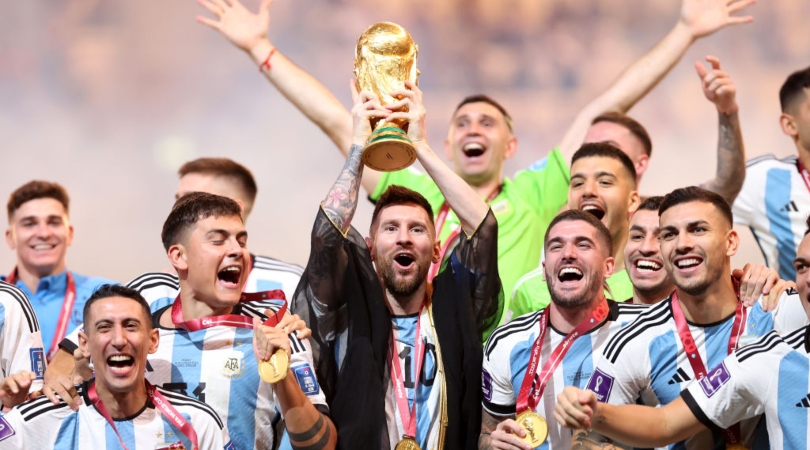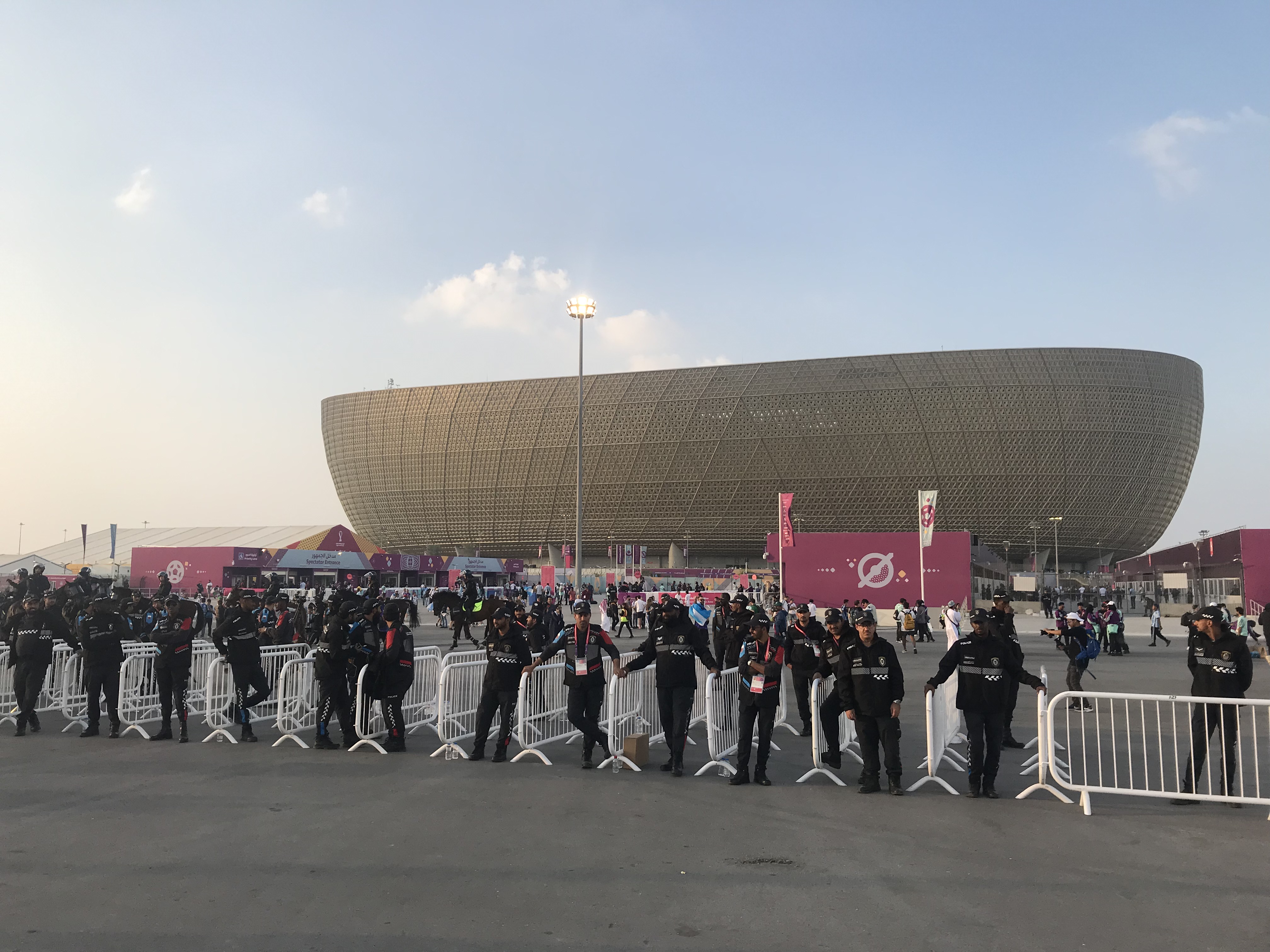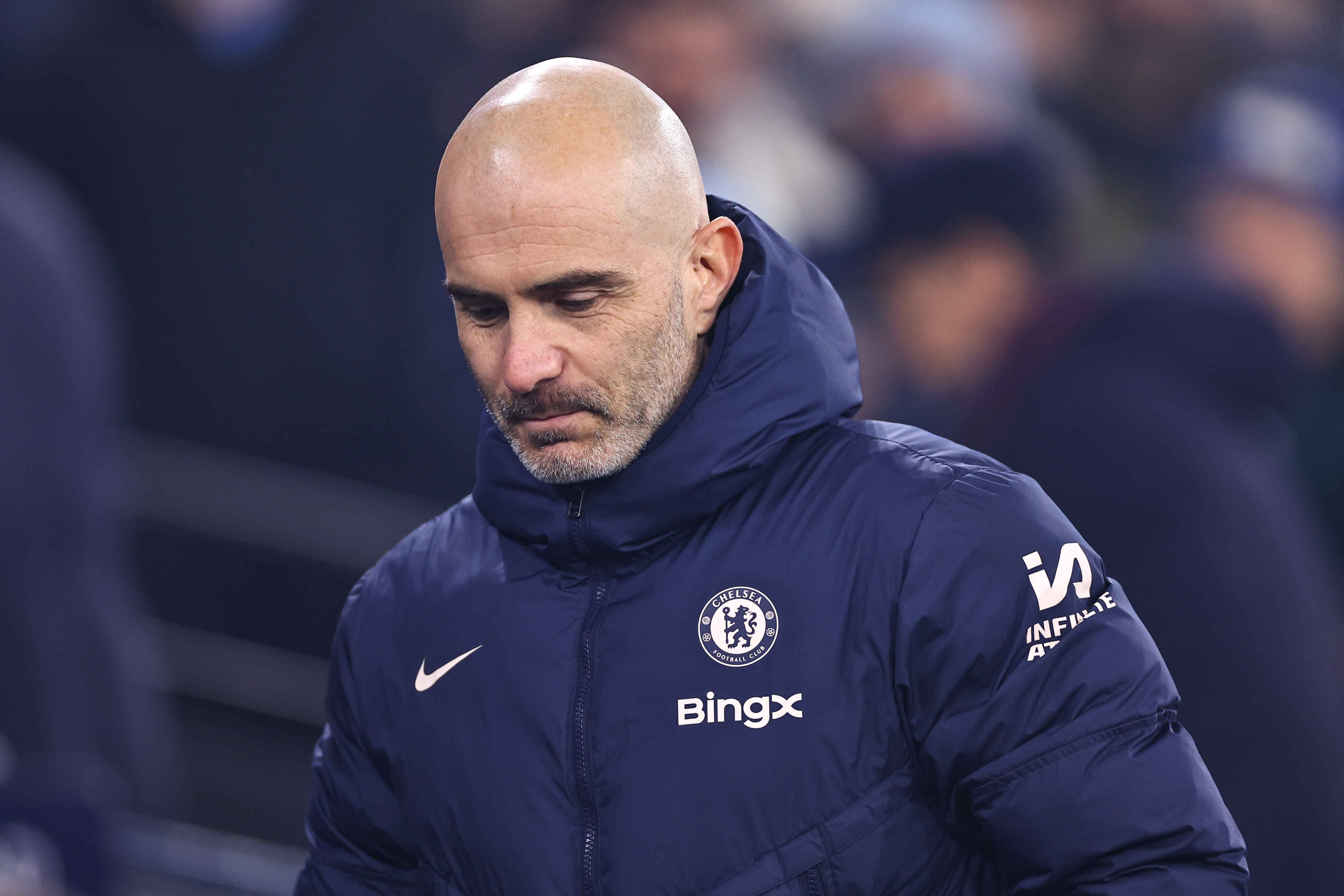The night Lionel Messi made history: what it was like to be at the greatest World Cup final ever
FourFourTwo were at the Lusail Stadium to see a legend complete his legacy, as Argentina defeated France in a game for the ages

"Please! Please!" The bus driver was becoming increasingly concerned, as singing Argentina fans climbed on top of the moving vehicle on a Qatari motorway, and started banging on the roof.
FourFourTwo were on a public bus, making its way to the Lusail Stadium for the World Cup final, from the Al Janoub apartment village on the other side of Doha. Provided free of charge for the duration of this tournament, this afternoon it was packed with Argentina supporters, with not a France fan in sight.
Fans of the Albiceleste have been one of the biggest highlights of this tournament - outnumbered only by the Mexicans in the group stage, then dominating from thereon in. Around 40,000 of them were said to be in Qatar.
Over the past week, they'd understandably been in celebratory mood at the apartment village, turning it into a distant district of Buenos Aires, gathering in various areas to display giant Maradona flags, sing, have barbecues and play football, at all hours of the day. At 6am last night (and it was last night rather than this morning, because they hadn't gone to bed yet), they could still be heard chanting away. "Messi! Messi!" they sang - in their eyes, no time of day was inappropriate for hero worship.
When they got on the bus for what could be the biggest day of their football lives - many were not even born the last time Argentina won the World Cup in 1986 - it was clear this was going to be a fun journey. "Please, we cannot let the bus leave until you sit down!" staff urged them, as they jumped up and down, singing songs.
"Vamos Argentina, sabes que yo te quiero, hoy hay que ganar y ser primeros, esta hinchada loca, deja todo por la copa, la que tiene a Messi y Maradona!"
"Come on Argentina, you know that I love you, today you have to win and be first, these crazy fans, leave everything for the cup, the one with Messi and Maradona!"
Get FourFourTwo Newsletter
The best features, fun and footballing quizzes, straight to your inbox every week.
The bus was literally bouncing - the fans never did sit down, so staff laughed and gave up, and the bus began its journey to the Lusail. A fan took control of the bus driver's microphone, and started leading the chants that way, before eventually they opened the sunroof and climbed on to the top of the bus, just about hanging on when the vehicle turned tight corners. Locals looked on amused, as we inched closer to our destination, past the Al Janoub Stadium, past the Al Thumama Stadium, past the Khalifa International Stadium, and on to the Lusail.

For once traffic was heavy on the normally deserted motorways of Doha, as Argentina flags flew from car windows. Many locals were making their way to Lusail, tickets or no tickets, just to enjoy the atmosphere.
We wandered our way down Lusail Boulevard, the Qatari equivalent of Wembley Way, lined with restaurants, as the Qatari version of the Red Arrows buzzed backwards and forwards overhead. The area was packed, full of people just having a good time, without the menace present outside the Euro 2020 final, when alcohol-fuelled fans tried to force their way into the stadium. Argentina fans, Qataris, migrant workers holding India and Palestine flags, even the odd France supporter (there haven't been many of them in the Middle East throughout the tournament), all mixed in the afternoon sun.
There was a sense of being at the centre of the world today. Few global events are bigger than a World Cup final - the last one was watched by more than a billion people.
Security was understandably high, even compared to previous games at the Lusail Stadium, with a line of police to stop anyone getting too close to the arena without a ticket, and an armoured riot van on hand just in case it was needed.
Kiosks handed out free France and Argentina flags to spectators - there seemed to be a lot more takers for the Argentina flags, unsurprisingly. Since the very start of this tournament, locals had come out in force to support the Albiceleste, donning Messi shirts galore.
This was this writer's first ever visit to a World Cup final, a fulfilment of a long-held dream, and a fifth visit to the magnificent Lusail Stadium during this tournament - a stadium that looks about three times bigger on the inside than it does on the outside. One word of warning, though: if you're heading to the top tier, take the lift rather than the stairs if you get the chance. We found out the hard way - it makes the climb to the away end at St James' Park feel like a cakewalk.

Four of our visits to this 88,000-capacity venue have been to see Argentina, who've practically lived at the stadium throughout this World Cup, presumably deliberately designed to let Messi-crazy Asia see the great man play in the biggest numbers possible, but with the added bonus of being rather handy preparation for the Albiceleste if they made the final.
Not that it looked like they were going to make the final on our first visit to the Lusail 26 short days ago, when they were stunned by Saudi Arabia. Back then, travelling Argentina fans had been out in force too, only to be silenced by a comeback that absolutely no-one saw coming, after Messi had put Lionel Scaloni's side ahead from the penalty spot.
As thousands of Saudi fans celebrated, Argentina supporters left disconsolately - they'd been so full of confidence, heading to Qatar on a 36-match unbeaten run, akin to Italy's long undefeated sequence before Euro 2020. But once more at the World Cup, things seemed to be falling apart, in the very first match.
It was one of the biggest shocks in World Cup history - filed with France's defeat to Senegal in 2002, West Germany's loss to Algeria in 1982, and Argentina's own humiliation against Cameroon in 1990. Germany never recovered from losing their opening game to Japan at this tournament, but Argentina made the final after their Cameroon loss 32 years ago, and they did it again here.
After semi-final victory over Croatia, Messi explained how the Saudi Arabia game had even benefited them, focusing the minds. Lose another game after that, and their tournament was over. The pressure was on, and they thrived to survive.
There were dramas along the way, admittedly: FFT were there for the madcap game against the Netherlands, played in a fevered atmosphere, after Messi's genius no-look assist for Nahuel Molina, the Netherlands' incredible comeback, Leandro Paredes' frankly hilarious decision to boot the ball at the entire Dutch bench from point-blank range (exactly the sort of thing we want from Argentine football), then the unforgettable celebrations that followed penalty shoot-out victory. We thought it was heading towards a full karate-kick post-match brawl, but you can't have everything.
We were there, too, for Messi's assist for the ages in the last four, turning Josko Gvardiol inside out, just as the 20-year-old begins his journey to become one of the best defenders in the world. If the crowd were already making noises of amazement when he escaped Gvardiol, they knew they'd potentially just witnessed history when he teed up Julian Alvarez to fire it into the net.
On many occasions, being in Qatar has felt like witnessing history in the flesh. We've watched enough previous tournaments on TV to know that the events of any World Cup are remembered - when those events involve Messi and Kylian Mbappe, even more so.
Argentina and France had met only three times before at the World Cup - on the first occasion, in 1930, the Albiceleste had just gone 1-0 up when the referee blew for full time six minutes early, just as Les Bleus went clear on goal. Understandably, they weren't best impressed, play resumed after protests, but France couldn't find an equaliser.
On the last occasion, in 2018, the apprentice defeated the master, Mbappe producing the defining moment of his career up to this point, scoring two stunning goals to overcome Messi in a thrilling 4-3 victory, on the way to World Cup glory at 19.
We were in the stadium for France's first match of this tournament, too: against Australia, Mbappe's performance was a joy to behold, a sign that he was ready to pick up exactly where he left off in Russia four years ago. Watch out, Miroslav Klose, your World Cup record of 16 goals is under threat - when he scored twice against Poland in the last 16 of this tournament, Mbappe had already moved to nine, from just 11 appearances.
He's flourished in this French side under the astute management of Didier Deschamps, a history maker in a quieter fashion: a World Cup winner as both a player in 1998, and a manager in 2018.
So reluctant was he to be the centre of attention, that he brushed away questions before this final of the opportunity in front of him - to be the first person ever to win the tournament twice as a manager and once as a player. Just winning it twice as a manager would have put him in rare company - only Vittorio Pozzo, victorious with Italy in 1934 and 1938 - had ever done that before.
Only twice before had a nation retained the World Cup - that Italian side, and the Brazil team of 1958 and 1962. Star in a third team to achieve the feat, and Mbappe would have been following in the footsteps of Giuseppe Meazza, of Pele and Garrincha. A reminder: he doesn't even turn 24 until Tuesday.
Messi was already making history in this final, win or lose, surpassing Lothar Matthaus' long-held record of 25 matches played in the World Cup. Coincidentally, he'd made his Argentina debut against Matthaus' Hungary side in 2005, and been sent off inside 60 seconds.
Victory though, would represent something far greater - greater than anything achieved by any World Cup winner in modern memory. This would be Diego Maradona in 1986, or Pele in 1970 - a legendary player strengthening his case to be regarded as the best player of all time, in a way that can only be done by winning the World Cup. Given everything he'd already achieved at club level, it would arguably end the debate once and for all.
Since the first international match was played 150 years ago, few individual fixtures had ever carried such significance, carrying the capacity to shape football history that will remain with us for decades and decades to come. Pele's 1970 triumph is still revered more than half a century on - this was Messi's chance for immortality, too.
All this, at 35, in what he'd already said would surely be his last ever World Cup match. Win or bust. Seal his status as the greatest player ever, on what would surely be the finest day of his long footballing life, or head into retirement with a hole in his legacy that tortured him forevermore, beaten in a World Cup final not once but twice.
Oh, and there was the chance to bag his first ever World Cup golden boot, and probably a record eighth Ballon d'Or as well. Mbappe has been obsessed with just winning one - it was a duel for every honour going, between two team-mates from Qatari-owned PSG. The hosts couldn't believe their luck. So eager had they been to have both players on their books for this World Cup, that they'd offered two of the biggest salary packages in football history - to lure Messi last year when he left Barcelona, then to persuade Mbappe not to join Real Madrid this summer.
Unlikely many other games at this World Cup, fans were at their seats in large numbers more than an hour before kick-off, as singer Maitre Gims and pals treated them to a live performance of the tournament's official song during the closing ceremony.
Packed behind one goal, once they'd gathered inside the stadium, French fans actually seemed to be present in greater numbers than for the semi final and quarter final, but they were still vastly outnumbered by the Argentines at the other end - and all around the stadium in fact. Just the sight on the big screen of Messi getting off the team bus prompted roars from those supporting the Albiceleste, who whistled deafeningly when Les Bleus emerged for the pre-match warm-up. At a best estimate, around three-quarters of the people inside the stadium looked to be cheering on Argentina.
Before kick-off, there was applause around the stadium for a video of legends who have passed away since the last World Cup, reaching a crescendo with the great Maradona.
Scaloni brought Angel Di Maria back into Argentina's line-up for the final - the former PSG man scored the winner in their Copa America final victory over Brazil last year. France had been hit by illness before this showpiece, but Raphael Varane, Dayot Upamecano and Adrien Rabiot were all declared fit enough to start.
Knowing his side had a numerical disadvantage in the crowd, Giroud approached the France fans and whipped them into a frenzy before kick-off, but still they were being outsung, as Argentines chanted and bounced on the wall at the front of the stand.
The South Americans had the first attempt of the game, as Alexis Mac Allister tried to become the first Brighton and Hove Albion player to score in a World Cup final - rumours that Pele once had a loan spell at the Goldstone Ground are unfounded - but saw his long-range shot saved by Hugo Lloris.
Argentina had started the brighter of the two teams, with Messi more involved than Mbappe, the crowd noticeably offering a roar of excitement every time each of them got the ball. Argentina were getting some joy down the right flank, taking advantage of Mbappe's lack of tracking back.
In the end though, it was on the left where they got their breakthrough, as Di Maria slipped past Ousmane Dembele, then was clumsily felled by the winger inside the box. Suddenly, Messi had a penalty to send him towards his destiny. No pressure, Leo, but there are about a billion people around the world hoping you score this.
He stood at the same end of the same stadium where he'd scored from the spot in the opening minutes of Argentina's very first game at this tournament, against Saudi Arabia. He stood at the same end of the same stadium where he'd scored from the spot against the Netherlands and Croatia, too - this was his fifth penalty of the World Cup, after missing against Poland at Stadium 974 in the Albiceleste's final group game.
At the Lusail though, Messi again made no mistake, waiting until Lloris committed himself in one direction, then rolling the ball into the other corner. Messi passed 1,000 career games at this tournament, but no single kick of the football had ever seemed so critical to his legacy.
Argentina fans were jubilant - Di Maria gave his long-time pal a joyous bear hug, before Messi pointed to the sky and punched the air. It moved him on to six goals for the tournament, boosting his advantage in the race for the golden boot. It also moved him on to 12 career World Cup goals, level with Pele.
Thirteen minutes later, he looked like he had one hand on the World Cup, playing his part in a thrilling counter-attacking goal, impishly flicking the ball around the corner for Alvarez, before Mac Allister crossed for Di Maria to fire home. The stadium erupted, the roof almost lifted straight off, as the Albiceleste end descended into a maelstrom of celebration.
With France being destroyed down both flanks, and Argentina knocking the ball around with all the confidence in the world, Deschamps decided he had to take drastic action - hauling off Dembele and Olivier Giroud after only 41 minutes, introducing Randal Kolo Muani on the right, and Marcus Thuram on the left, allowing Mbappe to switch to centre forward, where his lack of defensive work would have a lesser impact.
Still, Argentina pushed on in the second half for another goal, Messi coming close to poking one home inside, as it increasingly became one big Buenos Aires party inside the arena. "Messi! Messi!" came the chant once more.
Soon their side began to sit back a little, but a jinking run from Mbappe ended with the increasingly frustrated forward firing over the bar. Argentina fans started to shout 'Ole!' after every pass - who knew they were such big fans of Manchester United's 1999 Champions League winner.
The game wasn't over, though - with just over 10 minutes left, Kolo Muani was felled in the box by Nicolas Otamendi, and Mbappe stepped up, firing his spot kick into the bottom corner, to draw level on six goals for the tournament with Messi, but still behind in the golden boot race by virtue of one fewer assist.
From being in complete control, suddenly Argentina's defence panicked one more, and one goal became two, just as it did against Saudi Arabia and against the Netherlands. Inevitably, the man to capitalise was Mbappe, superbly exchanging passes with Thuram in a lightning quick motion that no other player on the planet can produce, before dispatching a volley past Emiliano Martinez into the far corner.
France had been improbably rescued by a moment of brilliance from their star man, whose seventh goal of the World Cup put him above Messi in the quest for the golden boot. The biggest match in world football was being decided by a personal duel by two number 10s, by two legends of the game - one of them still only 23.
Argentina fans sung on during extra time, but for a while it felt like someone had turned the volume down, the concern almost audible in their voices. That changed dramatically in the second period, when it looked like Messi had won it yet again, poking home a rebound from close range, right in front of his adoring supporters, after playing in Lautaro Martinez. He'd surpassed Pele with a 13th World Cup goal, the golden boot was his again, and surely the trophy this time.
Incredibly, not so, as Gonzalo Montiel handled in the area, allowing Mbappe to complete his hat-trick from the spot, becoming only the second person in history to score a treble in the World Cup final after Geoff Hurst in 1966, remarkably moving himself level with Pele himself on 12 career World Cup goals at just 23, and reclaiming the golden boot yet again in a see-saw battle.
He almost slalomed through to score a solo goal in the final minute, shortly after Lautaro Martinez had somehow headed wide at the other end. The crowd were gasping with virtually every kick of the ball by this stage, so unbelievable had this game become. Put simply, it had developed into the best World Cup final ever, and one of the greatest matches of all time.
No one could take the golden boot off Mbappe once the game went to penalties, but finally the World Cup was Messi's. Both of the legends netted their spot kicks, before Emiliano Martinez saved from Kingsley Coman, and Aurelien Tchouameni fired wide. Argentina fans next to us in the stands were already screaming at the top of their voices in excitement when Montiel fired home the winner.
As Messi collapsed to the turf in joy, a shirtless supporter rested his head beside us, not out of exhaustion, but just pure emotion, pure happiness. This game perfectly summed up Messi's World Cup career - dazzling, denied, dazzling again, denied again, made to try again and again before the trophy came his way.
This was his moment. This was Messi's World Cup. Such has been his contribution inside this arena over the past four weeks, they should probably build a statue outside pretty soon, or go the whole way and just rename it the Lionel Messi Stadium.
It's two years since Maradona died - since then Argentina have played two tournaments. Having not lifted a trophy since 1993, they won Copa America in 2021, and now the World Cup in 2022, powered by a determination to honour their departed legend, and by the quality of the legend still in their midst.
"Diego is watching us from heaven, he's pushing us, and I hope it stays that way until the end," Messi said midway through this tournament. Indeed it did. Just like Maradona, Messi now has a World Cup to his name too, at long last. His career deserved nothing less.
Today at the Lusail Stadium, everyone present was privileged to witness history.
Today at the Lusail Stadium, Lionel Messi's legacy as the greatest player of all time was finally complete.

Chris joined FourFourTwo in 2015 and has reported from 20 countries, in places as varied as Jerusalem and the Arctic Circle. He's interviewed Pele, Zlatan and Santa Claus (it's a long story), as well as covering the World Cup, Euro 2020 and the Clasico. He previously spent 10 years as a newspaper journalist, and completed the 92 in 2017.
